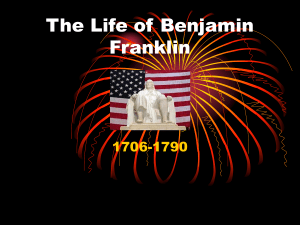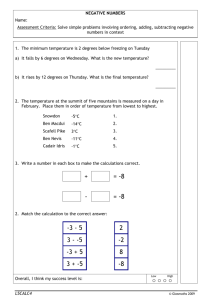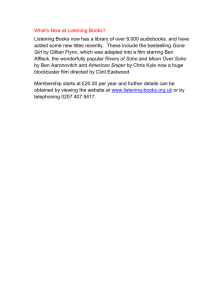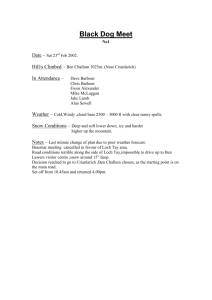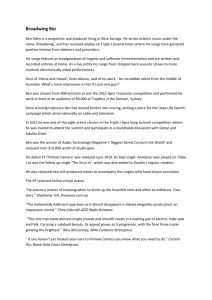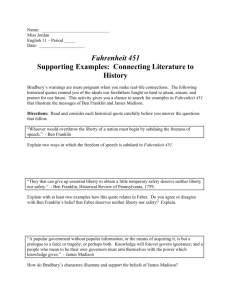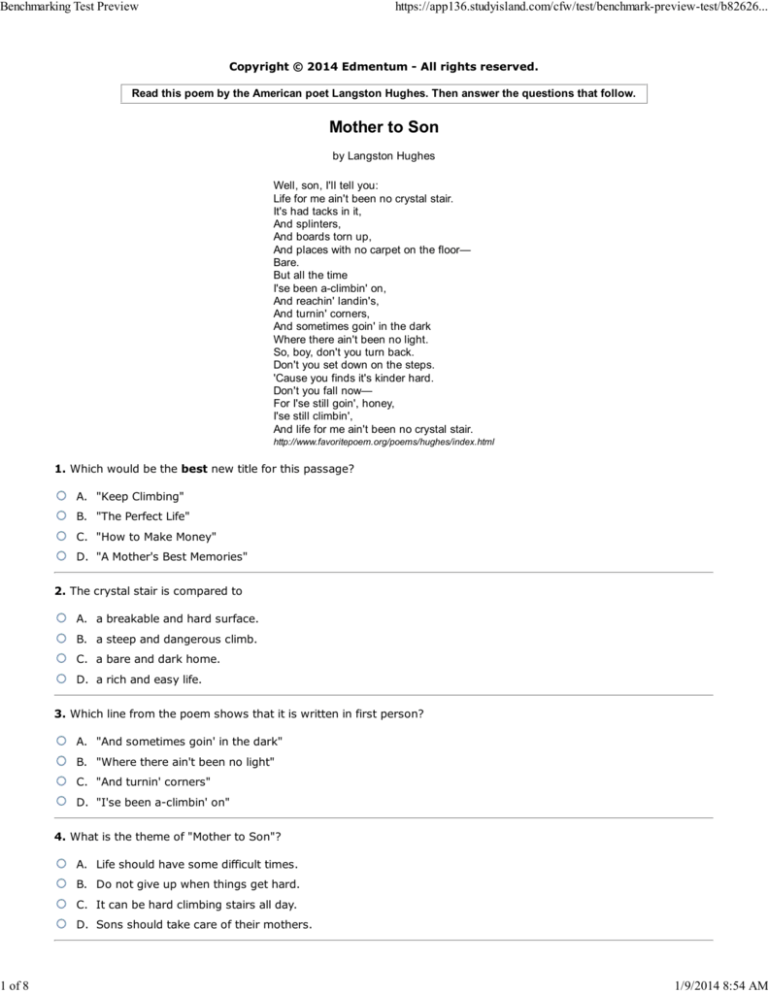
Benchmarking Test Preview
1 of 8
https://app136.studyisland.com/cfw/test/benchmark-preview-test/b82626...
Copyright © 2014 Edmentum - All rights reserved.
Read this poem by the American poet Langston Hughes. Then answer the questions that follow.
Mother to Son
by Langston Hughes
Well, son, I'll tell you:
Life for me ain't been no crystal stair.
It's had tacks in it,
And splinters,
And boards torn up,
And places with no carpet on the floor—
Bare.
But all the time
I'se been a-climbin' on,
And reachin' landin's,
And turnin' corners,
And sometimes goin' in the dark
Where there ain't been no light.
So, boy, don't you turn back.
Don't you set down on the steps.
'Cause you finds it's kinder hard.
Don't you fall now—
For I'se still goin', honey,
I'se still climbin',
And life for me ain't been no crystal stair.
http://www.favoritepoem.org/poems/hughes/index.html
1. Which would be the best new title for this passage?
A. "Keep Climbing"
B. "The Perfect Life"
C. "How to Make Money"
D. "A Mother's Best Memories"
2. The crystal stair is compared to
A. a breakable and hard surface.
B. a steep and dangerous climb.
C. a bare and dark home.
D. a rich and easy life.
3. Which line from the poem shows that it is written in first person?
A. "And sometimes goin' in the dark"
B. "Where there ain't been no light"
C. "And turnin' corners"
D. "I'se been a-climbin' on"
4. What is the theme of "Mother to Son"?
A. Life should have some difficult times.
B. Do not give up when things get hard.
C. It can be hard climbing stairs all day.
D. Sons should take care of their mothers.
1/9/2014 8:54 AM
Benchmarking Test Preview
2 of 8
https://app136.studyisland.com/cfw/test/benchmark-preview-test/b82626...
5. What does the narrator mean by the line, "For I'se still goin', honey/I'se still climbin'"?
A. She is glad she has had hardships in her life.
B. She wants her son to go through hardships.
C. She is not letting hardships pull her down.
D. She thinks that hardships build character.
6. Which line best supports the generalization, "Life for me ain't been no crystal stair"?
A. "Don't you set down on the steps"
B. "It's had tacks in it / And splinters"
C. "I'se been a-climbin' on"
D. "So, boy, don't you turn back"
7. The author's purpose is most likely to
A. describe the importance of family.
B. teach a lesson about life.
C. instruct how to build a nice staircase.
D. explain how to climb stairs.
8. Which word best describes the mother?
A. lazy
B. determined
C. weak
D. angry
Read the passage below about an April Fools' Day joke. Then answer the questions that follow.
Foolish Switch
Jodi and Bea sat next to each other, looking out opposite windows from the back seat of their mom's car. Every so often, they
would turn to look at each other to give a tiny grin.
"Stay on your toes today," their mom said from the driver's seat. "Remember that today is April 1, and people may try to pull pranks
on you."
The sisters were very aware of the date. They had already started the perfect prank for the occasion.
Earlier that morning, they helped each other get ready for school. They switched clothes, backpacks, and hairstyles. When they
were finished, each girl felt that she was looking in a mirror. They were remarkably identical twins, and they were going to fool
everybody.
By lunchtime, the plan seemed to be working. Teachers and students didn't notice that they had a new student in class. Jodi and
Bea sat together at lunch and laughed about how clever they were.
Right after lunch, Jodi had to go to Bea's gym class. They were studying gymnastics, and the coach had constructed a simple
obstacle course. They just had to walk across a couple balance beams, flip over a bar, and do cartwheels down one of the basketball
court lines.
Jodi confidently started to do a cartwheel, but her hand slipped halfway through the movement. She imagined she could see her
body falling head first like an audience watches a slow motion movie. She registered each inch her body traveled toward the hard gym
floor. This…can't be…happening, she thought. It felt like a long fall, though it happened in the time it took onlookers to gasp. With the
1/9/2014 8:54 AM
Benchmarking Test Preview
3 of 8
https://app136.studyisland.com/cfw/test/benchmark-preview-test/b82626...
thud of her body on the floor, her vision went black.
Everyone looked shocked. The coach became scared as he realized Jodi wasn't moving. He sent a student to get help. Rumors
about the accident spread quickly. When Bea heard, she was excused from class and bolted to the gym. She burst into the gym but
slammed on the brakes when she saw a paramedic fixing a neck brace to stabilize Jodi's head.
"That's Jodi!" Bea yelled at the coach and paramedic. Dozens of doubtful faces turned toward her. "I'm Bea. That's Jodi."
"What are you talking about?" the coach growled at Bea. "This is serious. What's going on?"
"We just switched places for today," Bea said, looking at her classmates. No one seemed to think it was funny. "It's April Fools'
Day, remember?"
The paramedics left with Jodi on a stretcher. Bea stood outside and waited for her mom to pick her up. She was worried about
having to tell her mom the truth.
"Hurry up, Bea. We have to move fast," her mom said as the car pulled up and the door opened.
Bea's heart skipped a beat. She stared at her mom with a questioning gaze.
"You didn't fool me," her mom said.
Of course we couldn't trick Mom, Bea thought. Also, tricking the school didn't turn out the way she planned. Bea felt like the fool
that day.
Her mom's cell phone rang. She answered anxiously and listened. She slumped against her seat and let out a long breath.
"It's the doctor," her mom said. "Jodi's awake and is going to be perfectly fine."
9. Why do Jodi and Bea think they are clever at lunch?
A. They got a free lunch from the cafeteria lady.
B. They successfully switched places at school.
C. They both made good grades on their tests.
D. They made up stories about other students.
10. Read the following sentence from the passage.
"When Bea heard, she was excused from class and bolted to the gym."
As used in the sentence, what does the word bolted mean?
A. ran
B. talked
C. hopped
D. attached
11. What does the phrase slammed on the brakes mean?
A. felt worried and scared
B. stopped moving suddenly
C. broke a special item
D. finished driving a car
12. Jodi and Bea would best be described as
A. playful.
B. athletic.
C. funny.
D. mean.
1/9/2014 8:54 AM
Benchmarking Test Preview
4 of 8
https://app136.studyisland.com/cfw/test/benchmark-preview-test/b82626...
13. This passage is mostly about sisters who
A. compete against each other.
B. play a prank that backfires.
C. trick their mom on April Fools' Day.
D. cause a serious accident.
14. Which best describes Bea's problem in the passage?
A. She wants to do a better cartwheel.
B. She needs to go to the hospital.
C. She needs to tell everyone the truth.
D. She wants to stop her sister's prank.
15. The author most likely included the first paragraph of the passage to establish the
A. theme.
B. rising action.
C. main characters.
D. conflict.
16. The climax of the passage is when
A. Jodi falls while doing a cartwheel.
B. the doctor calls the mom's cell phone.
C. the sisters laugh during lunch.
D. the sisters get ready for school.
17. Which word best describes how Bea feels after seeing Jodi with a neck brace?
A. tired
B. confused
C. mad
D. worried
Read this passage about Benjamin Franklin. Then answer the questions that follow.
Benjamin Franklin: American Printer and Writer
When Benjamin Franklin was a young boy, he wondered what his career would be. In the 18th century it was up to a boy's father
to decide. Ben's father first thought he should be a preacher and sent him to school. But school was expensive and would take many
years. His father took him out of school after only two years. He put 10-year-old Ben to work at the family business, making soap and
candles.
What Ben really wanted was to go to sea and sail on a ship. He was an excellent swimmer, loved the ocean, and dreamed of
working on a ship. Sadly, an older brother had died at sea, so his father would not allow it. When another brother, James, returned
from England to set up a printing business, their father knew what to do. Ben loved to read, so why not become a printer? To make
sure he didn't run off to sea, his father convinced Ben to become his brother's apprentice. Ben could help his brother and learn a
valuable skill.
Apprentices had to sign contracts that said they would obey and work for their master for a certain amount of time. The bosses
1/9/2014 8:54 AM
Benchmarking Test Preview
5 of 8
https://app136.studyisland.com/cfw/test/benchmark-preview-test/b82626...
were called masters because they were very good at their jobs. Ben reluctantly signed up to be his brother's apprentice for nine long
years. He was 12 years old at the time, so he would work for his brother until he was 21.
Becoming a Printer
James made Ben set type, clean up, and make deliveries. Ben's job was not different from other apprentices. The two brothers
printed all kinds of things, from almanacs to sermons. Ben worked hard and learned quickly.
In 1721, James decided to start a newspaper. At the time, there were already two newspapers in Boston. This newspaper, the New
England Courant, was different. Instead of reporting on news from Europe, the Courant reported on local news. It contained clever
articles from its readers. This format often meant that some of their material was controversial.
After a couple of very controversial stories in 1723, the Massachusetts legislature decided that the Courant should be punished.
They thought it had mocked religion and the government. They put James in jail and passed an order that said, "James Franklin
should no longer print the paper."
But James and his friends figured out a good way around the order. They published the paper under the name "Benjamin
Franklin." Suddenly, Ben was the publisher of the New England Courant at age 17. To make sure it looked legal, James officially
ended Ben's apprenticeship. Ben no longer had to obey and work for James, his "master." Ben left home, ready to develop his own
career as a writer.
Becoming a Writer
Benjamin Franklin liked to write. He only had two years of schooling, so he had to teach himself how to write. He worked very hard
to practice his writing. When he was an apprentice, he wrote 14 letters for the New England Courant. He used the pseudonym Silence
Dogood when he wrote the letters. He pretended to be a middle-aged widow with funny and intelligent things to say. People
suspected that Dogood was not who she said she was. They were surprised, though, when they found out it was really young Ben
writing under a fake name.
Ben's most famous pseudonym was Richard Saunders, also known as Poor Richard. He wrote an almanac as Richard called Poor
Richard's Almanac. An almanac is a reference book filled with information like calendars and weather forecasts.
Poor Richard presented himself as a slightly dull, but often funny, country fellow who believed in hard work and simple living.
Many of Ben's most famous quotes are from Poor Richard's Almanac. Have you heard of the saying "haste makes waste" or "early to
bed and early to rise, makes a man healthy, wealthy, and wise"?
Poor Richard's Almanac was an instant success. Ben published one each year for the next 26 years and sold almost 10,000 copies
each year.
Ben wrote many things during his lifetime. He wrote articles for his newspaper, letters about his life, and essays on a wide range of
subjects like politics, science, libraries, and even fire stations. He also helped with changes to the Declaration of Independence.
Benjamin Franklin found success as an American writer and printer. He could be humorous or serious, but he always worked hard
and wanted to learn everything he could.
© 2000 Library of Congress. http://www.americaslibrary.gov/cgi-bin/page.cgi
18. Which statement best supports the generalization that Benjamin Franklin "worked hard to become a writer"?
A. "He only had two years of schooling, so he had to teach himself how to write."
B. "Ben’s most famous pseudonym was Richard Saunders, also known as Poor Richard."
C. "The two brothers printed all kinds of things, from almanacs to sermons."
D. "The bosses were called masters because they were very good at their jobs."
19. Read the following sentences from the passage.
"He used the pseudonym Silence Dogood when he wrote the letters. He pretended to be a middle-aged widow with
funny and intelligent things to say."
What does the word pseudonym mean?
A. fake name
B. funny and intelligent
C. editor
D. apprentice
1/9/2014 8:54 AM
Benchmarking Test Preview
6 of 8
https://app136.studyisland.com/cfw/test/benchmark-preview-test/b82626...
20. What is the main idea of the second paragraph?
A. Ben had to obey his father and work as a printer.
B. Ben felt angry when his father would not let him go to sea.
C. Ben's family was in mourning after losing a son.
D. Ben's brother, James, already had a successful career.
21. Based on the passage, why did the Massachusetts legislature make James stop publishing the New England
Courant?
A. It liked the other two newspapers in Boston better than the Courant.
B. It wanted to put an end to Ben's apprenticeship under his brother.
C. It thought Ben would be a more successful printer and writer.
D. It did not like some of the stories the Courant was publishing.
22. Based on the passage, Ben could not become a sailor because
A. his father was afraid he would die at sea.
B. his father needed help running the family business.
C. he could not swim and was afraid of the ocean.
D. he needed to work on the Declaration of Independence.
23. How does Ben most likely feel about ending his apprenticeship?
A. excited
B. sad
C. confused
D. afraid
24. This passage was most likely written to
A. inform the reader how Franklin became a writer and printer.
B. persuade the reader to get a job as a writer or printer.
C. describe Franklin's childhood and dream of working on a ship.
D. prove that Franklin was not a smart student in school.
25. Which statement is the best summary of the passage?
A. Ben had many tragedies in his life, including losing a brother.
B. Ben fought with his father over his future career as a sailor.
C. Ben worked hard and became a successful printer and writer.
D. Ben had a supportive relationship with his educated brother.
Read the passage below about a fun lightning project. Then answer the questions that follow.
Lightning in a Pan
Lightning is beautiful, dangerous, and mysterious. The same brilliant flashes that inspire poetry and paintings can cause city-wide
power outages and raging forest fires. The average lightning bolt is only about five kilometers long and the width of a finger. However,
1/9/2014 8:54 AM
Benchmarking Test Preview
7 of 8
https://app136.studyisland.com/cfw/test/benchmark-preview-test/b82626...
it heats the surrounding air to a temperature five times hotter than the surface of the Sun. It can produce enough energy to power a
100-watt light bulb for three months. Try this easy experiment to make your own miniature version of a lightning bolt.
Materials
Aluminum pie plate
Ball-point pen
Thumb tack
Wool sock
Piece of Styrofoam
Instructions
1.
2.
3.
4.
Push the thumb tack up through the center of the pie plate.
Push the end of the pen onto the tack. Secure it with glue if necessary.
Rub the Styrofoam quickly with the wool sock.
Pick up the aluminum pie plate by touching only the pen and put it down on top of the Styrofoam. Be sure not to touch the pie
plate with your hands.
5. Turn out the lights and slowly bring your finger close to the pie plate. You should hear, feel, and see a tiny spark.
What's Happening?
As you rub the Styrofoam, it steals electrons from the wool and becomes negatively charged. Remember that like charges repel
and opposite charges attract. The extra electrons on the Styrofoam repel the electrons on the pie plate and push them to the top edge
of the plate. The pen acts as an insulator to prevent the built-up charge from moving through you until you are ready. When you bring
your finger close to the edge of the plate, the repelled electrons jump across the gap and escape through your body, giving you a
small shock. When you turn off the lights, you should be able to see (as well as hear and feel) the discharge.
Candy Lightning
Make lightning—in your mouth. Go into a dark room and chew up a few Wint-O-Green LifeSavers while looking in the mirror. This
is one time when it's okay to chew with your mouth open! Can you see the flashes in your mouth? Crunching the candy breaks the
sugar crystals and builds up opposite electrical charges on the pieces. Electrons jump between the pieces. They collide with nitrogen
molecules to make invisible ultraviolet (UV) radiation. The candy's wintergreen flavoring absorbs the UV radiation and releases the
spark you can see. It's science in your mouth. Try it!
Prove It
Crash! Flash! The lightning looms then the thunder booms. Thunder and lightning both happen at the same time. We see
lightning before we hear thunder because light travels much faster (300,000 km/sec) than sound (.3 km/sec). Just how far away is that
noisy storm? Count the number of seconds between seeing the lightning and hearing the thunder. Divide this number by three to get
a rough estimate of how many kilometers away the storm is.
"Lightning in a Pan" copyright © 2003 Peter Piper Publishing Inc. All rights reserved. Reprinted by permission.
26. Based on the passage, which step happens after placing the plate on the Styrofoam?
A. Rub the sock with the Styrofoam.
B. Use your finger to create a spark.
C. Press a thumbtack through the plate.
D. Draw a picture on the plate.
27. This passage is an example of
A. instructional writing.
B. narrative writing.
C. persuasive writing.
D. poetic writing.
28. The purpose of the section "Candy Lightning" is most likely to
A. encourage readers to eat more candy.
B. inform readers about the power of lightning.
C. entertain with a funny personal experience.
D. instruct how to do another lightning activity.
29. Lightning can cause power outages and forest fires because
1/9/2014 8:54 AM
Benchmarking Test Preview
8 of 8
https://app136.studyisland.com/cfw/test/benchmark-preview-test/b82626...
A. it produces a lot of heat and energy.
B. it is about five kilometers long.
C. it inspires poetry and paintings.
D. it is caused by 100-watt light bulbs.
30. As used in this passage, the word repel means
A. to cause disgust.
B. to lift up.
C. to move apart.
D. to look alike.
1. A
2. D
3. D
4. B
5. C
6. B
7. B
8. B
9. B
10. A
11. B
12. A
13. B
14. C
15. C
16. A
17. D
18. A
19. A
20. A
21. D
22. A
23. A
24. A
25. C
26. B
27. A
28. D
29. A
30. C
1/9/2014 8:54 AM


